|
escape to linux
Starting in September 2003 I took a radical step. A radical but liberating step. I got a new computer. And I don't use Windows on it.
That's right, my computer doesn't use Window$ anymore. It's not a Mac, either. Instead my computer uses an operating system called Linux.
And you couldn't pay me a million bucks to go back to Window$ again from Linux.
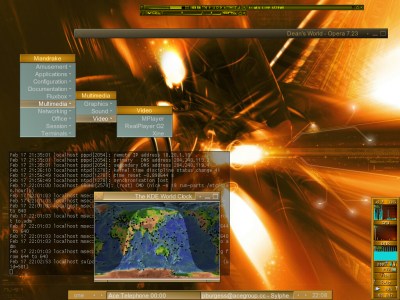 Here are the brass tacks. I've got an IBM ThinkPad T20 laptop, Pentium III, 700 MHz, 384 megs of RAM, 11.2 gigabyte hard drive. Running under Mandrake Linux 9.1 (to be precise, a dual-boot system with 10.1 gigs for Linux, 1.1 gigs for Window$ 98SE— though I haven't booted into anything but Linux in ages).
Here are the brass tacks. I've got an IBM ThinkPad T20 laptop, Pentium III, 700 MHz, 384 megs of RAM, 11.2 gigabyte hard drive. Running under Mandrake Linux 9.1 (to be precise, a dual-boot system with 10.1 gigs for Linux, 1.1 gigs for Window$ 98SE— though I haven't booted into anything but Linux in ages).
Mandrake Linux installed itself on my computer from CDs effortlessly in about 45 minutes. It autodetected all my hardware. The only tweak I had to make was to go in afterwards and edit the XFree86 config file, to cure the S3 Savage "scrolling hang." And of course with Linux you generally need an external modem (I got a Zoom Modem PC Card) instead of an internal winmodem. Apart from that, installation was automatic and trouble-free.
(Oh, one other word of advice, if you go with Mandrake: disable supermount. Believe me, supermount is not your friend.)
The two most popular Linux desktops are KDE and GNOME. (Window$ doesn't even give you a choice of desktops, only a choice of wallpaper.) I use a third choice, the Fluxbox window manager, which looks and works quite unlike any desktop you've ever seen in Window$. The point is, Linux gives you choices.
|
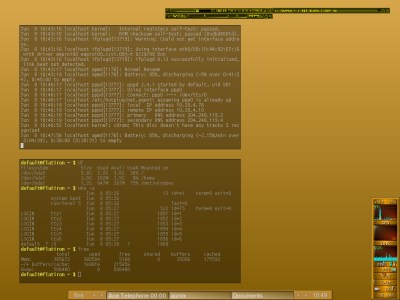 Linux runs like a top. It never crashes. The hard drive never needs defragmenting. It's way more secure than Window$. I simply don't have to worry about viruses anymore. And best of all, Linux and all the Linux software you'll ever need are free— I bought a boxed set of Mandrake Linux CDs with a manual and with online support, because I want to support the Linux movement. But you can pick up a set of CDs for next to nothing, or you can even download it off the Internet and burn it onto your own CDs for free.
Linux runs like a top. It never crashes. The hard drive never needs defragmenting. It's way more secure than Window$. I simply don't have to worry about viruses anymore. And best of all, Linux and all the Linux software you'll ever need are free— I bought a boxed set of Mandrake Linux CDs with a manual and with online support, because I want to support the Linux movement. But you can pick up a set of CDs for next to nothing, or you can even download it off the Internet and burn it onto your own CDs for free.
Linux, and most Linux software, is open source. That means the source code is available for free. Anyone is free to change it, anyone is free to redistribute their own modified version of it. That means Linux can never be stopped— someone else will always volunteer to step in and pick up the torch. It also means Linux will always keep on developing and evolving, in a decentralized and almost Darwinian manner, as people around the globe are free to try different ways of modifying and improving it.
|
And Linux is catching on. Linux is growing. Now you know what Bill Gate$ must be having nightmares about at night.
escape from window$
I switched to Linux for two reasons. One, Linux is way better than Window$. Two, if Bill Gate$ and Micro$oft are going to take over the world, it's going to be over my dead body.
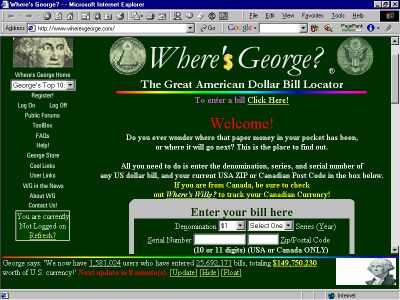 Micro$oft has long held the lion's share of the market— simply because Window$ comes preinstalled on most personal computers, along with Internet Explorer and a boatload of other software from Micro$oft. Thus many folks never realize that there even are any alternatives to Micro$oft Window$. Oh, well, yeah, the Mac— if you don't mind paying big bucks. But as far as most of us are concerned, there is no alternative to Window$. And as Burnham's Tenth Law puts it, "If there's no alternative, there's no problem."
Micro$oft has long held the lion's share of the market— simply because Window$ comes preinstalled on most personal computers, along with Internet Explorer and a boatload of other software from Micro$oft. Thus many folks never realize that there even are any alternatives to Micro$oft Window$. Oh, well, yeah, the Mac— if you don't mind paying big bucks. But as far as most of us are concerned, there is no alternative to Window$. And as Burnham's Tenth Law puts it, "If there's no alternative, there's no problem."
Except there is a problem. Micro$oft has established a near-monopoly in one field after another. Not because they're better, but simply because they're very good at leaving the user with no easy alternative. Something like 95% of all Internet users surf the Net with Internet Explorer. A similar percentage of the personal computers out there are using one version or another of Window$.
|
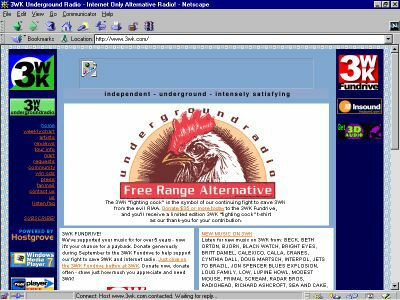 In the summer of 2003 Micro$oft finally maneuvered its distant second place competitor, the Netscape browser, into falling on its own sword. And that's only one more episode in the long-running drama of Micro$oft Über Alles. Remember WordStar? Remember PC-Write? Remember back in the days before Micro$oft Word achieved a supermajority share in the market for word processing applications?
In the summer of 2003 Micro$oft finally maneuvered its distant second place competitor, the Netscape browser, into falling on its own sword. And that's only one more episode in the long-running drama of Micro$oft Über Alles. Remember WordStar? Remember PC-Write? Remember back in the days before Micro$oft Word achieved a supermajority share in the market for word processing applications?
And it's not enough just to control the market. Micro$oft also wants to control and micromanage what you're permitted to do with your computer. Window$ XP introduced product activation: how do you like it when your computer has to "phone home" to Micro$oft for permission to install (or reinstall, or maybe even have to repurchase) software you've already bought? The next generation of Window$, codenamed Longhorn, will go even further. Look for only being able to play MP3 files if they're "approved." Look for documents and data files that can only be used by "approved" users, using "approved" software, and possibly only for a limited period of time. Eventually your computer's directory listings won't even reside on your own computer any more— rather, the master list of the files that are on your computer will be kept on a Micro$oft computer, somewhere "out there."
Do you really want to give Bill Gate$ & Company that kind of control over your computer and everything you do on it?
|
"One World, One Web, One Program"
—Micro$oft ad slogan
"Ein Volk, Ein Reich, Ein Führer"
—Adolf Hitler
should you switch to linux?
Good question. There are numerous distributions of Linux— Mandrake is the easiest for a newbie like me to get into, but Red Hat/Fedora and SuSE are good too. Also easy to use are Lindows/Linspire and Xandros. For the adept, there's also Debian, and Slackware, and Gentoo, and...
 If all you want to do is sit down at your keyboard, and use your computer to do the ordinary things— websurfing, e-mail, chat, word processing and other office tasks— then Linux is already there. You'll want to have a computer-savvy friend handy, just in case. And I honestly wouldn't recommend Linux to someone who's never really felt confident using Window$. But basically over the past couple of years Linux has arrived. It's ready for prime time.
If all you want to do is sit down at your keyboard, and use your computer to do the ordinary things— websurfing, e-mail, chat, word processing and other office tasks— then Linux is already there. You'll want to have a computer-savvy friend handy, just in case. And I honestly wouldn't recommend Linux to someone who's never really felt confident using Window$. But basically over the past couple of years Linux has arrived. It's ready for prime time.
If you enjoy getting "under the hood" and tinkering with things on your computer— if you're not put off by editing config files, and you like working from the command line— if perhaps you've even written and compiled some utilities and programs of your own— in other words if, like me, you're even a tenth of the way toward being a computer geek— then you'll love Linux. Yes, there is a learning curve. It took me two or three months to learn the ropes, and there are plenty of technical points I haven't yet begun to understand. But I'm learning, day by day.
Linux is a declaration of independence from monopoly operating systems, monopoly software, and monopoly attempts to play Big Brother to you and your computer. As Neal Stephenson put it, "If you don't like having your choices made for you, you should start making your own."
|
addendum— mandrake 10.1
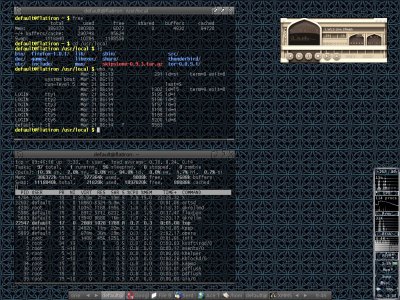 In December 2004 I moved from Mandrake 9.1 to Mandrake 10.1. Overall the transition went quite smoothly— this time around I pretty well knew what I was doing. I did a clean install, and even spending some time custom selecting software, it took me less than an hour. Also, I repartitioned my hard drive and got rid of my Window$ partition: I hadn't booted into Window$ in months. So no more dual boot— my computer is now Linux-only. In December 2004 I moved from Mandrake 9.1 to Mandrake 10.1. Overall the transition went quite smoothly— this time around I pretty well knew what I was doing. I did a clean install, and even spending some time custom selecting software, it took me less than an hour. Also, I repartitioned my hard drive and got rid of my Window$ partition: I hadn't booted into Window$ in months. So no more dual boot— my computer is now Linux-only.
Mandrake 10.1 is noticeably faster, and of course the software that comes with it is a year and a half more advanced. As installed from CDs, Mandrake 10.1 was somewhat buggy— this was cured by downloading and installing the initial round of updates. There are still a couple of quirks, for which I've found workarounds— these aside, Mandrake 10.1 is overall an excellent release.
|
Actually the biggest hassle I encountered was that one of the zip disks to which I backed up my personal data went bad! I was able to retrieve most of my data and settings, and reconstruct most of the rest— in the end, about all that proved irretrievable was a year's worth of chat archives. Like they say, make multiple backups of critical data.
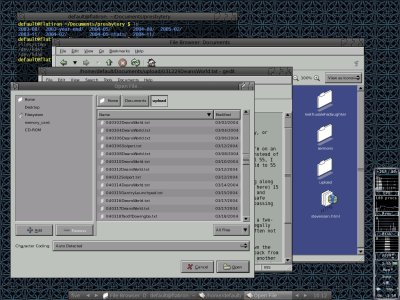 I'm still using the Fluxbox window manager, a much newer version than before— window decoration, Klowner's Graphite Integration; applications themed in an SGI IRIS Indigo style; and a decidedly "Nineties" wallpaper which I reconstructed by copy-and-paste from a screenshot I ran across out there. Transparent redglass cursor completes the look. Like I say, rather retro.
I'm still using the Fluxbox window manager, a much newer version than before— window decoration, Klowner's Graphite Integration; applications themed in an SGI IRIS Indigo style; and a decidedly "Nineties" wallpaper which I reconstructed by copy-and-paste from a screenshot I ran across out there. Transparent redglass cursor completes the look. Like I say, rather retro.
current status
My main browser is Opera. For email, Thunderbird. I read Usenet with the Pan newsreader. For chat, I use Gaim Pidgin. File manager? Usually Nautilus, though I can't stand spatial navigation— had to disable it and go back to the "old" configuration. AbiWord for word processing, GEdit for text editing, and Bluefish as an HTML editor. Updates to my website, I upload with gFTP. I listen to things with XMMS the Beep Media Player Audacious, and I watch DVDs with MPlayer. I've never been much of a one for computer games, though I do like Frozen Bubble. GKrellM with its many monitors, in the lower right-hand corner of my screen, is indispensible. And of course I still do a good part of my work from the BASH command line, generally in a transparent Aterm window.
|
Eight years after I first made the switch from Window$ to Linux, I'm very glad I did. There's nothing like taking control of your own computer, and making it what you will. I'll repeat that quote from Neal Stephenson: "If you don't like having your choices made for you, you should start making your own."
addenda
And in March 2006 I moved to Mandriva Linux 2006.
And in May 2007 I moved to Mandriva Linux 2007.
And in May 2008 I installed Mandriva Linux 2008 on my brand new Lenovo ThinkPad T61.
And in May 2009 I moved to Mandriva Linux 2009.
And in May 2010 I moved to Mandriva Linux 2010.
And in October 2010 I switched from Fluxbox to Enlightenment.
And in June 2011 I switched back to Fluxbox again :-)
And in November 2011, after 8 years with Mandrake/Mandriva, I changed to Mageia Linux. And (to make a long story short) I stuck with Mageia for a long, long time.
And in February 2016 I got a new Lenovo Thinkpad W541 with Ubuntu Linux 14.04 LTS, which I later updated to Ubuntu 16.04.
And in February 2020 I switched to Ubuntu 18.04 on a Thinkpad P53.
|